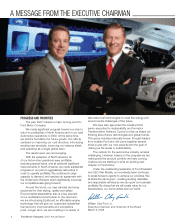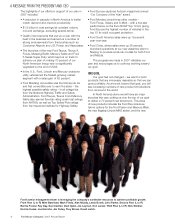Ford 2007 Annual Report Download - page 16
Download and view the complete annual report
Please find page 16 of the 2007 Ford annual report below. You can navigate through the pages in the report by either clicking on the pages listed below, or by using the keyword search tool below to find specific information within the annual report.
Management’s Discussion and Analysis of Financial Condition and Results of Operations
14 Ford Motor Company | 2007 Annual Report
Retiree Health Care Benefits. Pursuant to the MOU, we agreed with the UAW to permanently shift responsibility for
providing retiree health care benefits for current and former UAW-represented employees (measured at $20.2 billion on
our December 31, 2007 balance sheet) from the Company to a new retiree plan funded by a new independent Voluntary
Employee Benefit Association Trust ("New VEBA"). The effective date of the MOU is anticipated to occur in the third
quarter of 2008. This date is subject to, among other conditions, federal district court approval of the final settlement
agreement relating to the MOU and SEC pre-clearance of the accounting treatment of the New VEBA and our retiree
health care obligation. Implementation of the final settlement agreement relating to the MOU will not occur until the later
of January 1, 2010 or exhaustion of any appeals to district court approval.
As part of the MOU, we established a Temporary Asset Account ("TAA") as of January 1, 2008 for purposes of
segregating assets that will be transferred to the New VEBA. We are obligated to transfer the following assets to the TAA:
• cash of $2.73 billion, which we contributed to the TAA in January 2008;
• a $3 billion principal amount secured note, which will bear interest from January 1, 2008 at 9.5% per annum, mature
on January 1, 2018, and be secured on a second-lien basis with the collateral we have pledged as part of our
secured Credit Agreement;
• a $3.3 billion principal amount convertible note, which will bear interest from January 1, 2008 at 5.75% per annum,
mature on January 1, 2013, and be convertible into Ford Common Stock at a conversion price of $9.20 per share;
and
• deferred cash totaling $400 million, which represents the present value amount of 15 annual installment payments
of $52.3 million commencing April 1, 2008 (initial payments made to the TAA, and remaining payments made
directly to the New VEBA).
TAA assets together with any earnings thereon, and the assets of our existing internal health care VEBA ($3.74 billion
at December 31, 2007) together with any earnings thereon, will be transferred to the New VEBA upon implementation of
the final settlement agreement.
In addition to the foregoing payments to fund the New VEBA, we are obligated to continue to make payments for
ongoing retiree health care costs during 2008 and 2009, which are estimated at a total present value of about $2.3 billion.
If and when the MOU is fully implemented, the financial impact of shifting to the New VEBA our obligations to provide
retiree health care benefits for our current and former UAW-represented employees is estimated to be an improvement in
our ongoing annual net cash flow of about $1 billion and (subject to final valuation assumptions) a reduction in our
ongoing annual health care expense of about $2 billion.
Pension Enhancements. As part of the CBA, we agreed to enhance certain pension benefits for current and former
UAW-represented employees. These enhancements include, but are not limited to, increases in the basic monthly
pension benefit for both current and future retirees of $2.00 and $2.65, respectively, per year of credited service, and
lump-sum payments to current retirees of up to $700 per year over the term of the CBA. These enhancements increased
our pension benefit obligation for current and former UAW-represented employees by $1.6 billion at December 31, 2007.
Entry-Level Wage Structure. Certain newly-hired UAW-represented hourly employees (not to exceed at any time 20%
of the total number of our UAW-represented employees, subject to certain exceptions discussed below) would have wage
and benefit levels below those we are currently paying existing UAW-represented employees. These entry-level wage
and benefit levels would be in the range of $26 to $31 per hour, which is about 50% of current levels (excluding retiree
health care benefit costs), and are intended to be competitive with those provided by Japanese-based manufacturers to
employees at their U.S. plants. In the event that the 20% limitation is reached, employees at entry-level wages could be
elevated to the then-current traditional UAW wage level; importantly, however, the benefits (including cash balance
pension benefits and defined contribution health care benefits) would remain unchanged for these elevated employees.
In any event, neither entry-level employees hired into our Rawsonville or Sterling component plants, nor any entry-level
employees hired to perform work in our facilities that was previously outsourced to suppliers but which is being brought
back into our facilities from suppliers (i.e., "insourced"), will be counted against the 20% limitation.
























